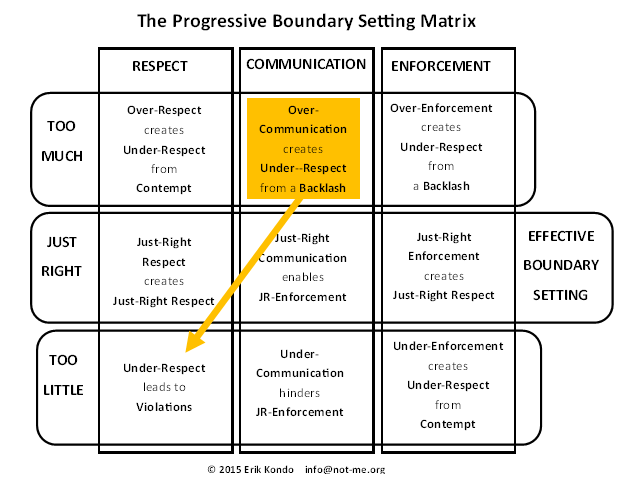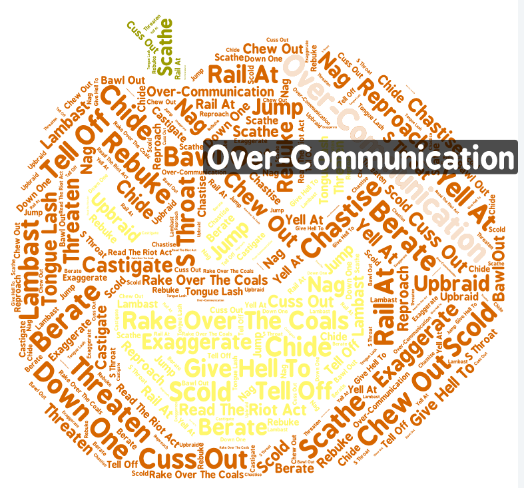The purpose of Communication is to enable Enforcement of the rules of behavior. Before the rules can be enforced, people need to understand the rules. Otherwise, the rules will be continuously violated due to a lack of understanding. But once understanding has been achieved, only those that don’t Respect the rules, violate them.
The goal of clear communication is to create understanding. But Over-Communication does not increase understanding. Over-Communication means that the other person “gets it”. He or she knows what the rules are, yet the communication continues unabated. Over-Communication creates an emotional backlash that leads to Under-Respect.
Some words for Over-Communication are:
Threaten, Berate, Nag, Exaggerate, Chide, Rebuke, Reproach, Scold, Castigate, Bawl out, Chew out, Cuss out, Tongue lash, Tell off, Rake over the coals, Rail at, Give hell to, Chastise, Lambast, Jump down one’s throat, Read the riot act, Scathe, Upbraid, Yell at, and more.
The multitude of words for Over-Communication is testament to how often it happens. The use of Over-Communication makes the target feel defensive and resentful. There is a large grey area where communication and enforcement intersect. Many times, people who engage in Over-Communication are ineffectively using it as a means of enforcement.
Sometimes, people use Over-Communication to vent their frustrations. In this case, the goal is not to create an understanding of the rules. The communication is a verbal and/or written retaliation for the emotional benefit of the communicator. In this way, Over-Communication is a parallel to Over-Enforcement. It is about the feelings of the enforcer. It is not about enabling Just-Right Enforcement (appropriate) with the goal of creating Respect.
It is easy for most people to think of examples of Over-Communication in their own life. Most likely, everyone has engaged and been targeted by Over-Communication many times. Therefore, it should also be simple to remember the emotional effect of this Over-Communication. How it led to less respect, not more.
Over-Communication can also be seen on a multi-person scale. Many social justice activists regularly engage in Over-Communication as they repeat the same mantra as part of their cultural change/awareness campaigns. For example, assume a small segment in any particular Group engage in some type of unwanted behavior, but the entire Group is lectured on not breaking the rules. Many of those that already know the rules and respect the rules, will resent what they feel to be an Over-Communication. As with Over-Enforcement, Over-Communication is in the eyes of the Beholder(s).
The end result is that many of the targeted Group will feel defensive and alienated. They will lose some of their prior Respect. The longer and more intense the Over-Communication, the greater the Backlash against it. Many in the field of social justice have no concept of the dangers of Over-Communication. They think the more communication the better. In their minds, there can never be enough awareness about their issue of choice.
Effective communication must be gauged by its result. The goal of clear communication is to create understanding in order to enable enforcement. Beyond that, it becomes Over-Communication and will eventually lead to Under-Respect for the rules of behavior.
Over-Communication is determined by a person’s point of view. The following videos are examples of what I consider to be Over-Communication. Other people may have a different opinion, which is one of the many complications of creating effective communication.
Video Examples:

